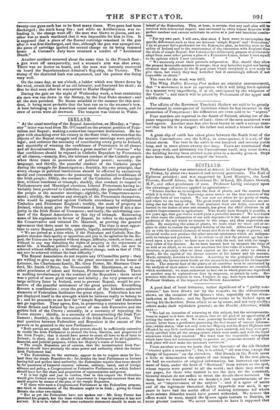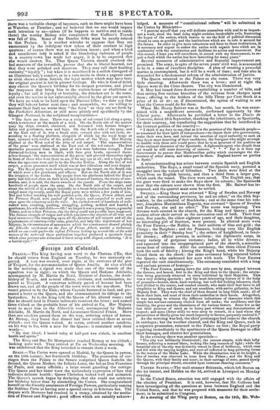SCOTLAND.
Professor Liebig was entertained at dinner, in Glasgow Trades Hall, on Friday, by about two hundred and seventy gentlemen. The Earl of Eglinton presided ; and was supported by Lord Blantyre, the Lord Provost, Sheriff Alison, the Reverend Dr. APLend, Mr. James Oswald, M. P., and other gentlemen of note. Professor Liebig enlarged upon the advantage of science applied to agriculture- " Science teaches us to recognize the food of plants, and the sources from which it is derived. This knowledge alone makes us the true masters of the soil—the lords of our capital. We can now see where we are guilty of wake, and where we are too sparing. The great truth that animal manures are no- thing else but the ashes of the food produced from our fields, consumed or burned in the bodies of men and animals, has given the chief direction to all modern improvements in agriculture. Who would have thought it possible, a few years ago, that gas-works would yield a powerful manure ? We now know on what cause the exhaustion of our soils depends—it is the most precious in- gredients of the soil which we remove in the crops, and thus impoverish our fields. By analyzing the ashes of plants, we learn what we must add or re- place in order to restore the original fertility of the soil. Africa and Peru sup- ply us with the mineral elements of bread and flesh in the shape of guano; and chemical works now produce the other mineral substances which are indispen- sable to turnips and potatoes. It is evident to all that the present age has en- tered upon a new path: we have now to do with the real, not with the imagi- nary value of the manure. As we have learned how to measure the value of an acid or an alkali, so we can now ascertain the true value of a manure. This, therefore, is precisely what we must expend on the soil in order to obtain a profit; for the capital of the farmer consists of his labour and his manure. Much, certainly, remains to be done. According to the geological character of the soil, the farmer must decide on the means to be employed for its improve- ment. The mineral food of the plants of all countries must be ascertained by the analysis of their ashes : we must determine which substances are essential, which accidental; we must endeavour to find out in which plant one ingredient or another may be replaced—as lime by magnesia, or potash by soda. Re- searches with these objects in view, I rejoice to say, have been undertaken by Professor Graham, at the request of the British Association."
A good deal of local irritation, rather significant of a "guilty con- science," has been drawn out by the remarks on the obtrusiveness shown on the occasion of the Queen's visit, especially on the reem- barkation at Dundee ; and the Spectator seems to be looked upon as having bit the hardest. Some allude to us by name, and not very civilly; others make their rejoinders general ; as the Dandee Advertiser, which says- " We had no intention of returning to this subject, but the misrepresenta- tions in regard to it have been so firms, that we are glad of an opportunity of setting the matter at rest. We were yesterday favoured with the sight of a private letter from a gentleman possessing the best means of correct informa- tion; which states, 'that not only were her Majesty and his Royal Highness not offended by any little confusion which might have occurred, but they were per- fectly satisfied with all the arrangements which were made, and with the loyal attentions which they received.' We trust that the respectable newspapers which have been led unintentionally to publish an erroneous account of what took place will now make the necessary correction." From another source we learn that the Spectator of the 5th October "created quite a sensation "; but, it is added, " all was true, except the charge of bayonets" on the obtruders. Our friends in the North seem a little to misconceive the nature of our remarks. In the first place, we had no exclusive or original information, but borrowed our state- ment of facts, under the head of "Scotland," from writers on the spot, whose reports were patent to all the world ; and there they stood on our pages, for those who desired to see the data for the comment. General denials do not suffice to rebut the details there narrated. Oa those facts we founded what we deemed a just superstructure of re- mark, or "improvement of the subject " ; and if a spice of satire and of the legitimate rhetorical figure hyperbole was used, it ap- pears to have had the useful effect of making strictures tell where more solemn didactics would have passed unheeded. We believe the effect would be seen, should the Queen again venture to Dundee, in some greater caution. We never intended to have it supposed that there was a veritable charge of bayonets, such as there might have been at Waterloo or Peterloo ; and we believed that no one would impute such intention to us—unless (if he happens to survive and to reside there) the worthy Bishop who complained that Gulliver's Travels was full of fibs. Some of the Dundee folks must be nearly related to that Prelate. It is another mistake to suppose that they are exonerated by the indulgent view taken of their conduct in high quarters : of course there was no malicious intent ; and when a kind and considerate lady is asked if the blundering rudeness of people in a country-town has made her angry, it is to be expected that she would answer, No. That Queen Victoria should overlook the bad manners of the townsfolk, proves that she is liberal-hearted, not that they were polished and decorous. They may call their hustling curiosity " loyalty " ; but when it is manifested in a selfish disregard of an illustrious lady's comfort, or in a vain desire to share a pageant such as civic shows seldom furnish, the loyal motive which may have been the original pretext is lost in grosser feelings. He who is fond of drink may choose the Queen's birthday for his deepest potations, and plead the trespasses that bring him to the station-house as ebullitions of loyalty ; but call it loyalty or bestiality, the drunken act is the same, and even the motive is not substantially altered by the gloss put upon it. We have no wish to be hard upon the Dundee folks ; we dare say that they will behave better next time ; and meanwhile, we are willing to account their fault no worse than "the facts" as they are set forth by the Perthshire Advertiser, or still more plainly and specifically by the Glasgow National, in the subjoined recapitulation- " The facts are these. There was a strip of red carpet laid along a quay, which terminated at the mouth of a dock. On the North side of the narrow quay lay ships, covered, clustered, and festooned with human beings— ladies and gentlemen, men and boys. On the South side of the quay, and at the East end of it, was a broad stair, covered also with red cloth, de- scending to a floating platform, alongside of which lay the royal barge or boat, manned with twelve of the picked sailors of the Navy. Her Majesty alighted at the West end of the strip of red carpet. • The representatives of the press' were stationed at the East end of the red carpet. The first spectacles presented from this point of view were ludicrous enough. Four distracted-looking men in black, with bare grey heads, squeezed them- selves through • the representatives of the press, and planted themselves right in front of those who were there to see, if for any use at all ; and a laugh arose when the squeezers were said to be the Dundee Bailies. Along the line of red carpet, a scene presented itself which was at first ridiculous and next disgust- ing. The Royal party were slowly advancing up the carpet, on the South side of which were a few gentlemen and officers. But on the North side of it was the irruption of the Goths. The people from the platforms behind the Royal party had followed close on their heels, in defiance of barriers, the staves of con- stables, and, it is said, the drawn swords of the guards. From the ships came hundreds of people upon the quay. On the North side of the carpet, and about the middle of it, a single constable in a broad-brimmed hat flourished his cudgel most vigorously, until the Royal party were within a few yards of him. But just before reaching his well guarded post, the Queen, Prince Albert, and the Princess Royal, were pushed off the carpet, and compelled to walk some steps upon the causeway next the river. An excited crowd of hundreds of well- coated men, crushing, pushing, struggling, jostling, mobbed and hustled a gentleman, his wife and child—Oh ! we forgot it was a young Queen, a graceful Prince, and an infant Princess, else the thing could not possibly have happened. The furious struggle of vulgar and selfish passions—the absence of all true and loyal reverence—the trampling upon all the dictates of self.respect and all the requirements of courtesy—the calm, graceful, and lady-like deportment of her Majesty, in circumstances of annoyance which her countenance showed plainly she felt—the excitement on the face of Prince Albert, amidst a turbulence which no one could quell—the infant Princess looking up scared-like at the wild masses of the snob—all these particulars together produced a spectacle from which some persons who witnessed it burst away with disgust, exclaiming, It is a horrid sight!



























 Previous page
Previous page